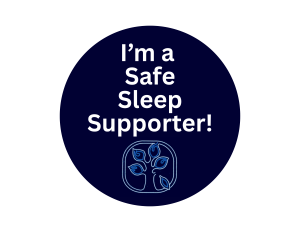
Recently, we've seen heartbreaking reports and recalls linked to popular baby sleep items. Companies often market these products as safe sleep solutions for babies but they have contributed to hundreds of infant deaths. Over 3,000 infants die in sleep-related incidents in the U.S. every year, and some of these deaths are directly connected to unsafe baby products.
These products can be off-brand knockoffs sold on Amazon or they can be produced by major brands such as Fisher-Price, Kids2, and Boppy. Marketing can be intentionally confusing, and many products appear to be safe or useful to help your baby sleep. SIDS of Illinois wants to help you understand these dangers and know how to choose safe products and sleep environments for your baby.
Dangerous baby products to avoid
1. Inclined sleepers
Products like the infamous Fisher-Price Rock 'n Play Sleeper (linked to over 100 infant deaths) and other inclined sleepers (anything inclining more than 10 degrees) are highly dangerous. Babies placed in these products can slouch into a chin-to-chest position, compressing their airway and making it difficult to breathe. Babies can also roll over within the device and suffocate. The Safe Sleep for Babies Act of 2022 banned the manufacture and sale of these products, but you may find some being resold or used by unaware consumers.
2. Crib bumpers (padded and mesh)
Padded bumpers and mesh crib liners are now also banned under federal law due to the risk of suffocation, entrapment, and strangulation. Babies can get tangled in them, press their face against them, or use them to climb out of the crib. You can still find images online with crib bumpers, and many parents are not aware that they have been outlawed.
3. Weighted sleep products
The American Academy of Pediatrics (AAP) and the U.S. Consumer Product Safety Commission (CPSC) warn against using weighted sleep sacks, swaddles, or blankets. The added weight can compress a baby's developing rib cage, making it harder for them to breathe. It can also inhibit their ability to startle themselves awake, which is a natural protective reflex against SIDS.
4. Sleep positioners/nests/loungers
Products designed to keep a baby in a specific position or create a "snug" sleep environment are not safe for sleep. If a baby rolls over in these soft items, their airway can become blocked. Deaths have been linked to many different types of infant loungers and positioners.
5. Any soft bedding in the crib
Many pictures on social media show cribs full of attractive, fluffy blankets and stuffed toys. Unfortunately, these cute items pose a suffocation risk and should never be in a baby's sleep space. This includes loose blankets, pillows, quilts, comforters, and soft toys.
Remember the ABCS of safe sleep
The danger in these products often stems from soft surfaces, restricted airways, and the risk of rebreathing exhaled air. The ABCS of safe sleep, endorsed by SIDS of Illinois, is simple: Alone, Back, Crib, Smoke-free.
A - Alone: Your baby should sleep alone. No bed-sharing with parents, siblings, or pets.
B - Back: Always place your baby on their back for every sleep, for naps and at night.
C - Crib: Use a firm, flat, non-inclined sleep surface (a crib, bassinet, or portable play yard) that meets current safety standards. The sleep space should be completely empty: no loose blankets, pillows, bumper pads, stuffed animals, or sleep positioners. A fitted sheet is all you need.
S - Smoke-free: Baby's room and home environment should be free of all smoke and vaping.
How to choose safe baby products
When buying baby sleep products, prioritize safety more than anything else.
Check for CPSC compliance: Look for products that clearly state they meet the safety standards of the U.S. Consumer Product Safety Commission (CPSC). You can also check CPSC.gov for recalls or safety alerts.
Keep it simple: The safest sleep products are often the simplest. You only need a crib/bassinet, a firm mattress that fits snugly, and a fitted sheet.
Choose wearable warmth: Instead of loose blankets, use sleep sacks or wearable blankets to keep your baby warm. For newborns, you may use a swaddle until they show signs of rolling over.
Be skeptical of claims: Be wary of any product that claims to "prevent SIDS," "keep baby on their back," or offers a "sleep solution" that involves soft surfaces or incline. There is no product that can guarantee SIDS prevention beyond following all safe sleep guidelines.
Room-share, don't bed-share: Many dangerous products purport to allow parents to safely bed-share. However, room-sharing (baby in their own safe sleep space in your room) is strongly recommended by the AAP to reduce SIDS risk and facilitate feeding.
By making informed choices and adhering to expert-backed safe sleep guidelines, you can create a secure sleep environment for your baby, ensuring their safety and giving you much-needed peace of mind. Your baby's life is worth every careful decision.
About SIDS of Illinois
Sudden Infant Death Services of Illinois, Inc., is a not for profit, 501(c)(3) organization dedicated to the prevention of sudden, unexpected infant death by providing educational programs to families, healthcare professionals, law enforcement, childcare providers, and the general public as well as bereavement services to families and any others who have experienced the tragedy of sudden, unexpected infant death. Donate here to become a Safe Sleep Supporter!
